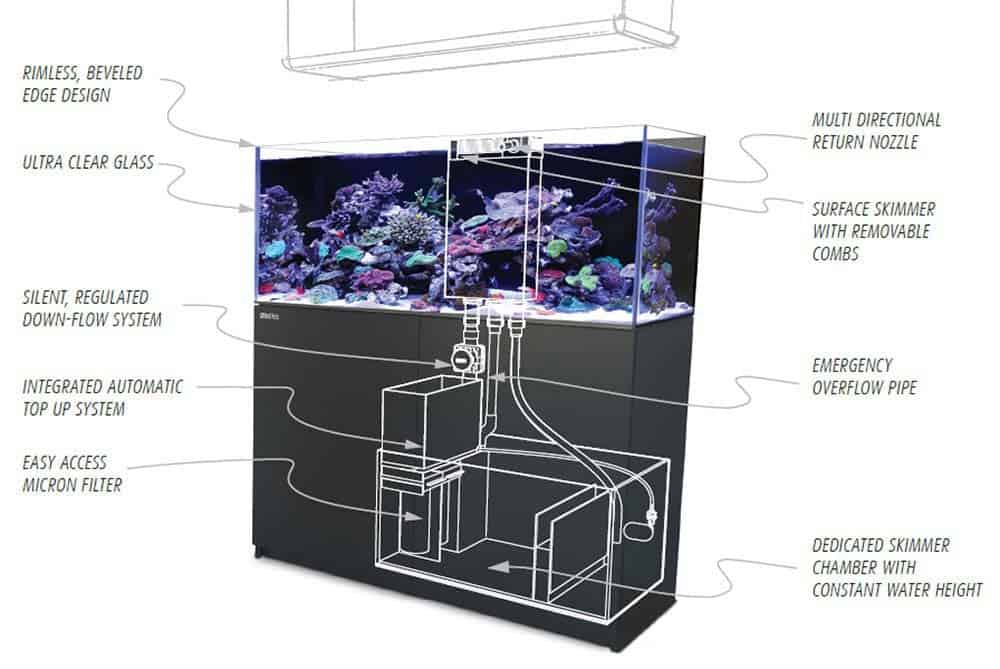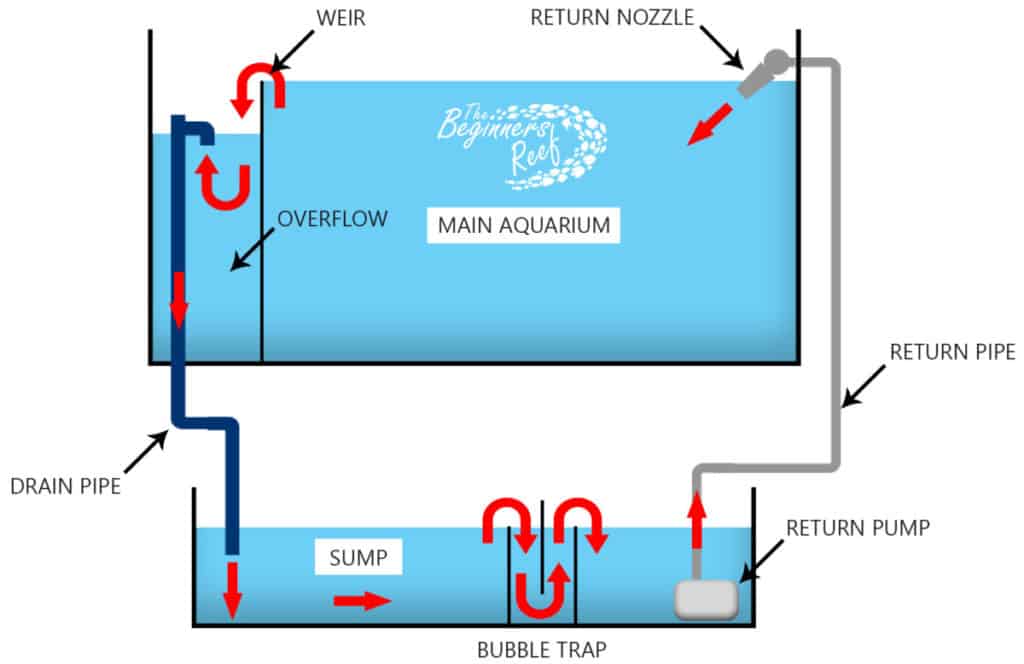Originally posted on May 21, 2023 @ 6:00 pm
Last Updated on 1 month by admin
Freshwater sump aquariums have become a popular choice for many hobbyists looking to keep their aquatic pets in a healthy and stable environment. However, with any aquarium setup, there are both pros and cons to consider before making a decision. In this article, we will explore the advantages and disadvantages of having a freshwater sump aquarium, so that you can make an informed decision about whether this type of setup is right for you and your aquatic pets.
On the one hand, a freshwater sump aquarium can provide many benefits for your aquatic pets. With a sump system, you can increase the water volume, which helps to dilute toxins and keep your aquarium water stable. Additionally, a sump can provide a place for filtration and other equipment, which can help to keep your main tank clutter-free and easy to maintain. However, there are also some potential downsides to consider, such as the additional cost and complexity of setting up a sump system.

Pros and Cons of Having a Freshwater Sump Aquarium
Freshwater sump aquariums are becoming increasingly popular among aquarium enthusiasts. They offer several benefits over traditional aquarium setups, but there are also some drawbacks to consider. In this article, we will discuss the pros and cons of having a freshwater sump aquarium.
Pros
1. Increased Water Volume: One of the most significant advantages of a freshwater sump aquarium is the increased water volume. The sump provides additional water capacity, which helps to dilute toxins and other pollutants in the aquarium water. This helps to maintain stable water conditions and a healthy environment for your fish and other aquatic creatures.
2. Flexible Filtration: Another benefit of a freshwater sump aquarium is the flexibility it provides in terms of filtration. The sump can be customized to include different types of filtration media, such as mechanical, biological, and chemical filters. This allows you to tailor the filtration system to the specific needs of your aquarium and its inhabitants.
- Mechanical filtration removes debris and particles from the water.
- Biological filtration uses beneficial bacteria to break down harmful toxins.
- Chemical filtration removes dissolved impurities from the water.
3. Improved Aesthetics: A freshwater sump aquarium can also enhance the overall aesthetic appeal of your aquarium setup. The sump can be hidden away in a cabinet or stand, which helps to minimize equipment clutter and keep the focus on the aquarium itself. This can create a more natural and visually appealing environment for your aquatic pets.
4. Reduced Noise: The sump can also help to reduce noise levels in your aquarium setup. The water is pumped from the main tank to the sump, where it is filtered and then returned to the main tank. This can help to reduce the noise created by equipment such as powerheads and canister filters.
Cons
1. Cost: One of the biggest drawbacks of a freshwater sump aquarium is the cost. Sump aquariums can be more expensive to purchase and set up compared to traditional aquarium setups. The cost of additional equipment, such as pumps, filters, and plumbing, can quickly add up.
2. Space Requirements: Another consideration is the space requirements for a freshwater sump aquarium. Sump aquariums can take up more space than traditional aquarium setups, which can be an issue if you have limited space available. Additionally, the sump needs to be located below the main aquarium to function properly, which could limit placement options.
3. Maintenance: A freshwater sump aquarium may require more maintenance compared to traditional aquarium setups. The sump needs to be cleaned regularly to prevent the buildup of debris and other contaminants. Additionally, the plumbing and other equipment associated with a sump aquarium may need to be maintained more frequently.
4. Risk of Overflow: There is also a risk of overflow associated with a freshwater sump aquarium. If the sump becomes clogged or the water level in the main aquarium drops too low, water can overflow from the sump into the surrounding area. This can cause water damage and potentially harm your aquatic pets.
Conclusion
In conclusion, a freshwater sump aquarium can offer several benefits over traditional aquarium setups, including increased water volume, flexible filtration, improved aesthetics, and reduced noise. However, there are also some drawbacks to consider, such as cost, space requirements, maintenance, and the risk of overflow. Before deciding to set up a freshwater sump aquarium, it’s essential to weigh the pros and cons carefully and consider your specific needs and circumstances.
Frequently Asked Questions
Here are some commonly asked questions about the pros and cons of having a freshwater sump aquarium.
What are the benefits of a freshwater sump aquarium?
A freshwater sump aquarium can provide many benefits for your fish and aquatic plants. One of the primary benefits is increased water volume, which helps to dilute any toxins or waste products that may be present in the tank. Additionally, a sump can provide a place for filtration equipment, such as protein skimmers and mechanical filters, which can help to maintain water quality. Sumps can also be used to house additional biological filtration media, such as live rock or bio-balls, which can increase the overall effectiveness of the filtration system.
Another benefit of a sump aquarium is that it can provide additional space for aquatic life. This can be especially important for larger fish or species that require specific water conditions, such as high or low pH. Finally, a sump can help to reduce noise in the main aquarium by housing equipment that might otherwise be noisy, such as air pumps or powerheads.
What are the drawbacks of a freshwater sump aquarium?
While there are many benefits to having a sump aquarium, there are also some drawbacks to consider. One of the primary concerns is the cost and complexity of setting up a sump system. Depending on the size of the aquarium and the equipment used, a sump can be a significant investment in terms of time and money. Additionally, a sump can take up a significant amount of space, which may not be practical for smaller aquariums or living spaces.
Another potential drawback of a sump aquarium is the risk of leaks or flooding. Because sumps rely on gravity to move water between the main tank and the sump, any failure or blockage in the system can cause water to overflow or leak. This can be especially problematic if the aquarium is located in a carpeted or hardwood area. Finally, sumps can be difficult to clean and maintain, particularly if they are heavily stocked with biological filtration media.
How do I set up a freshwater sump aquarium?
Setting up a freshwater sump aquarium requires careful planning and preparation. The first step is to choose an appropriate sump tank, which should be large enough to accommodate the equipment and filtration media needed for your aquarium. Once you have chosen your sump tank, you will need to plumb it into your main aquarium using PVC pipes or flexible tubing.
Next, you will need to install any necessary equipment, such as protein skimmers, mechanical filters, or heaters, into the sump tank. You should also add any necessary biological filtration media, such as bio-balls or live rock. Once the sump is set up, you can fill it with water and test the system for leaks or other issues. Finally, you will need to cycle the tank to establish a healthy bacterial colony before adding fish or other aquatic life.
What types of fish are best suited for a freshwater sump aquarium?
A freshwater sump aquarium can provide a healthy and comfortable environment for many different types of fish and aquatic life. However, it is important to choose species that are compatible with the water conditions and filtration system in your sump. Some popular choices for sump aquariums include cichlids, angelfish, and discus, as well as many types of tropical fish and invertebrates.
It is important to research the specific needs and requirements of any fish or plants you plan to add to your sump aquarium, and to make sure that they are compatible with the other species in your tank. Additionally, you should be prepared to monitor and maintain water quality in your sump on a regular basis to ensure the health and well-being of your aquatic life.
What maintenance is required for a freshwater sump aquarium?
Like any aquarium, a freshwater sump system requires regular maintenance to keep it healthy and functioning properly. This includes regular water changes, cleaning of filtration equipment, and monitoring of water quality parameters such as pH, ammonia, and nitrite levels. Additionally, you should be prepared to replace any biological filtration media as needed to maintain optimal water conditions.
Depending on the size and complexity of your sump system, maintenance may require a significant investment of time and effort. However, a well-maintained sump can provide many benefits for your fish and aquatic life, including improved water quality, increased space, and a more natural and comfortable environment.

FRESH WATER AQUARIUM SUMP HOW DOES IT WORK?
In conclusion, having a freshwater sump aquarium has its pros and cons. On the one hand, it provides a larger water volume, better filtration, and a more stable environment for your aquatic pets. On the other hand, it requires more maintenance and can be expensive to set up.
However, if you are willing to put in the time and effort to maintain your sump aquarium, the benefits can be significant. Your aquatic pets will have a healthier and more natural environment, and you will have a beautiful and fascinating addition to your home.
Ultimately, the decision to have a freshwater sump aquarium is a personal one that depends on your interests, budget, and willingness to commit to the necessary care. If you are passionate about aquatic life and willing to put in the work, a sump aquarium can be a rewarding and enjoyable experience.
